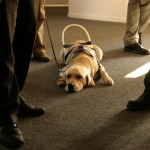 This week is National Assistance Dog Week. Assistance Dogs in the Workplace perform practical assistive tasks for their disabled partner. This is to avoid them being at a disadvantage and to enable them to be independent. They also provide guiding skills in the case of blind or partially sighted people.
This week is National Assistance Dog Week. Assistance Dogs in the Workplace perform practical assistive tasks for their disabled partner. This is to avoid them being at a disadvantage and to enable them to be independent. They also provide guiding skills in the case of blind or partially sighted people.
For employers, the issues around assistance dogs in the workplace comes down to making reasonable adjustments. The Equalities Act 2010 and Disability Discrimination Act 1995 require employers to make reasonable adjustments. This is to avoid discriminating against people with disabilities. A disabled person should not be put at a disadvantage due to their assistance dog. For example, an applicant for a job who is accompanied at interview by their assistance dog should not be treated differently. You must not consider them less able to do the job than candidates without assistance dogs. The obligation of the employer is to objectively assess the candidate’s ability to perform the duties in the job they are applying for.
If you appoint a candidate who has an assistance dog, there may be some changes that you need to consider making in the workplace. It’s reasonable to assume that assistance dogs in the workplace:
- will not wander freely around the premises
- will sit or lie quietly on the floor next to its owner. Assistance dogs are trained to go to the toilet on command. Therefore, unlikely to foul in a public place
- are instantly recognisable by the harness or identifying dog jacket they wear
Assistance dogs are sometimes not welcome in the workplace because employees complain of allergies. In the UK approximately 8% adults are sensitive to dog allergens. When an allergy risk to a specific individual is identified, the employer needs to take steps to reduce this risk. For example, by accommodating the two people separately. Refusal to accept assistance dogs in the workplace because other people ‘may’ be allergic is unlikely to be a reasonable response.
Assistance dogs in the workplace undergo expert training over a period of many months. The owners ensure that they are entirely under control at all times. And they won’t constitute any sort of risk or nuisance to anyone. Assistance dogs in the workplace are trained to lie quietly under the table when their handler is working. The dog’s standards are assessed in many ways over a period of many months. They pass various tests relating to their standards of obedience. Also proving that the dogs do perform the practical tasks that their handler requires.
When you have assistance dogs in the workplace you need to give instructions to staff who are huge dog lovers and want to ‘play’ with the dog at work. You need to ask your employee about their assistance dog, and how they need colleagues to behave around their dog. You need to be sure other employees don’t distract the dog from its support role for your employee.
To cope with someone’s fear of the dog at work it will be essential to listen to what the person’s fears are. Try to work out some strategies to minimise contact between the dog and the person who is afraid. Mediation between the dog’s handler and the frightened employee could help for them to reach a comprimise.
Likewise, other employee’s fear of dogs is an important consideration that you must address if raised. The solution will not be straight forward. The law is clear, you may not discriminate against an employee who has an assistance dog. However, the law is also clear that if someone raises a grievance with you, because they are now frightened of a dog in the workplace, you need to listen to those grievances.
What to do Next
As it is, you may need to make adjustments to the working area that your new employee and their dog will occupy. You may need to review access routes to the work area and ensure there is enough room for the dog to be comfortable near its owner.
Therefore, if you have an issue with assistance dogs in the workplace, give us a call now on 01706 565332. We can help you think through the best way forward.
Metis HR is a professional HR Consultancy based in the North West of England supporting clients across the country. We specialise in providing outsourced HR services to small and medium-sized businesses. Call us now on 01706 565332 to discuss how we may help you.


